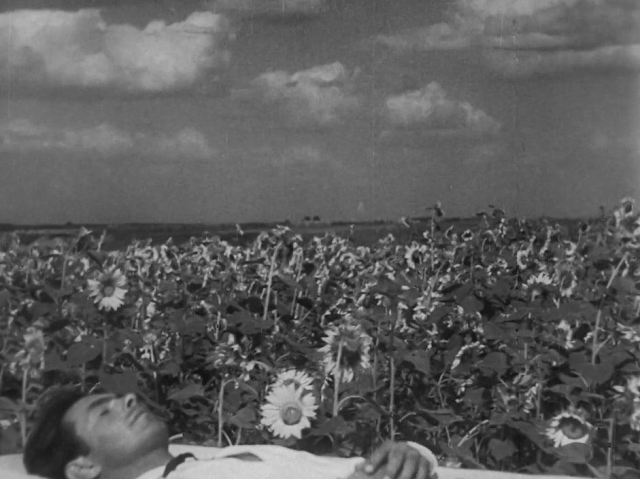Earth (1930)
Alexander Dovzhenko's "Earth"
Alexander Dovzhenko is one of Soviet cinema's early important filmmakers, alongside his comrades Sergei Eisenstein, Dziga Vertov, and Vsevolod Pudovkin. His magnum opus, 1930's "Earth" would be one of the last great silent films to come out of Soviet cinema. The film, however, was very controversial upon its release, as it actively mulled the uncertainty of collectived farming.
The film centers on a small village of farmers who are split between how to view the new collectivization happening with their farms. Some denounce it and declare their resistance while others welcome it with much excitement. After the community welcomes their first tractor, they are able to harvest grain. Howerver, that night, one of the Soviet agents who endorses collectivization is killed. Upon his funeral, his father requests a secular funeral and denounces his Russian Orthodoxy, stating that his son's new ways were to be honored. During the funeral, the new widow mourns her husband, the priest curses the sinners, and the villagers ignore the confession of the murder who declares that he will resist collecitvization.
Dovzhenko based the film off a real event that occured in his home district. During Stalin's implementation of collectivized farming in the Ukrainian district, Dovzhenko noticed an "economic [and] mental transformation of the whole people." Many were so reluctant of their property and lands being seized that they resisted by killing their animals, sabotage agricultural machinery, and assassinated Soviet agents. "Earth" is a depiction of these events taking place.
Dovzhenko's film was lauded as a technical triumpth. Much of this has to do with the poetic vision he instills in the picture. He is able to capture the beauty of the land that so many of the villagers are trying to protect. The first images of the film are of grain fields swaying in the wind. The beauty and naturalism of the images directly intertwines with the ideological and cultural upheaval of the Ukrainian people. A way of life, along with the land, is being lost. Dovzehnko's quiet reflection of these phenomenoms allows for a sense of poetic injection that displays a quiet mourning of these ideas.
Despite being a formal masterwork, the film was banned within 9 days of its release. Many Soviet authorities and journalists panned the film for its "ideological shortcomings." Soviet poet Demyan Bedny called the film "counterrevolutionary" and "defeatist." Despite its banning, it has since been rediscovered in the post-Stalin era. Many consider the film the greatest Ukrainian film ever made.




Comments
Post a Comment